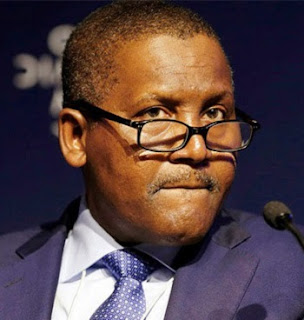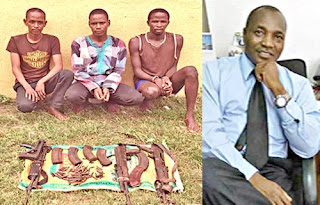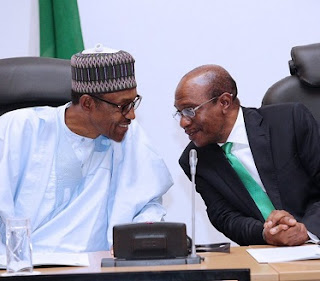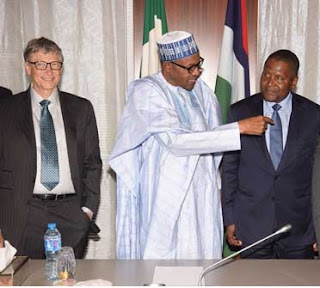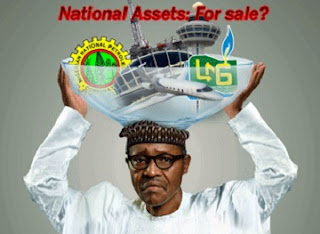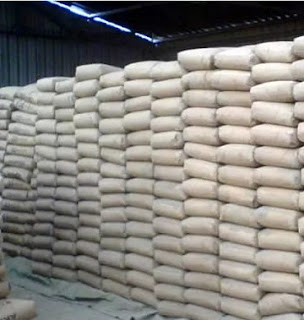2019: Presidency Cabals Shop For Buhari's Successor, Woos Dangote; Offers Him The President's Daughter As Bait, El-Rufai DROPPED
The Authority - With President Muhammadu Buhari barely two years in office, members of his kitchen cabinet, who have constituted themselves into a cabal, are already looking for his successor.
Their actions are prompted by growing questions over alleged governance deficits of President Buhari’s tenure.
The AUTHORITY learnt that members of the cabal running Aso Rock are no longer comfortable with Buhari’s performance and are worried that the North could lose the Presidency in 2019 if nothing was urgently done.
Leading members of the cabal are largely from Adamawa, Borno and Katsina States.
Sources also confirmed to The AUTHORITY that the high-stake game is borne out of the deep knowledge of the President’s health, which has fuelled speculations that Buhari may not run for a second term on health grounds.
Age is also not on his side. Born on December 17, 1942, President Buhari would be close to 77 years old by 2019.
Consequently, the North, which fought tooth and nail to retrieve power from the South, has started looking beyond Buhari.
The AUTHORITY further gathered that Africa’s richest man Aliko Dangote, who like the United States President-elect, Donald Trump, lacks any prior experience in government, has been fingered by the cabal as a worthy replacement for Buhari, come 2019.
To give more teeth to this quirky plot, some match-making by the cabal between Dangote and Buhari’s daughter, Fatima, was fine-tuned but ran into stormy waters.
Dangote, according to sources, was already warming up for the marriage and for a shot at the Presidency.
But Fatima, who, like her stepmother Aisha Buhari, has scant regard for the cabal’s arrowhead, “out-rightly” rejected the choice of Dangote.
She equally rejected the persuasive pressure of another influential member of the infamous cabal.
The AUTHORITY further learned that as 2017 draws near and in connection with crowning a successor to Buhari, key political realignments are expected to start taking shape.
A serving minister in the Buhari administration had recently shown how fluid the situation is by reportedly sending a text message to a member of the Peoples’ Democratic Party (PDP), asking about a “post-Buhari” scenario.
Today, Buhari has become very unpopular in the North due to the inability of his government to deliver governance that directly impacts the people.
On the other hand, the nature of the appointments he has made, defined by lack of consultation and inclusiveness, has alienated many.
The wife of the president had recently in a British Broadcasting Corporation (BBC) Hausa Service interview lamented that most officials of the government are not known to the President and the first family, adding that they are usurpers who did nothing to help the All Progressives Congress (APC) struggle in 2015.
The usurpers she was referring to in that controversial interview are the core members of the cabal that call the shots in Aso Rock, notwithstanding Buhari’s claims to the contrary.
The core four-member presidency cabal under reference reportedly didn’t vote in 2015 because they didn’t register to vote.
As the opposition carefully watches the unfolding development and fine-tunes its plot, the emerging poser is how the cabal hopes to pull off the audacious gamble.
This remains a subject of speculation considering that they lack political skills and are very unpopular.
The AUTHORITY recalls that in her famous interview, Aisha Buhari, when asked to name those who had hijacked the government, declared: “You will know them if you watch television.”
One of the key cabal arrowheads has to-date allegedly cornered more than N5 billion school furniture contracts from Kaduna, Katsina and Sokoto States.
The Kaduna State contract has however been terminated over “non-performance” by Governor Nasir el-Rufai, who unilaterally awarded it to Kaduna Furniture and Construction Company (KFCC) without due process.
The initial sum for the Kaduna furniture contract was N1 billion.
El-Rufai has never hidden the fact that his ultimate goal is the presidency. He has consistently told Kaduna State people that he is a one-term governor. The bad blood between a key member of the cabal, the chairman of KFCC and El-Rufai, is reportedly linked to the cabal offering the presidency to Dangote.
Sources further revealed that it was the last gasp effort to stop the Dangote-Fatima wedding using the Independent Corrupt Practices and Other Related Offences Commission (ICPC) that caused the anti-corruption agency’s chairman to be suspended from office before Buhari intervened.
The cabal had sacked the ICPC Chairman, Ekpo Nta, without the President’s knowledge - because he did not play ball - over claims that his tenure had expired.
Ekpo was reportedly ordered by the cabal to arrest Gimba Kumo, a former managing director of the Federal Mortgage Bank.
Similar efforts with the National Security Adviser (NSA) and the Economic and Financial Crimes Commission (EFCC) reportedly failed.
But the cabal never gave up, hence the reports in the media about the arrest of Kumo.
The Authority - With President Muhammadu Buhari barely two years in office, members of his kitchen cabinet, who have constituted themselves into a cabal, are already looking for his successor.
Their actions are prompted by growing questions over alleged governance deficits of President Buhari’s tenure.
The AUTHORITY learnt that members of the cabal running Aso Rock are no longer comfortable with Buhari’s performance and are worried that the North could lose the Presidency in 2019 if nothing was urgently done.
Leading members of the cabal are largely from Adamawa, Borno and Katsina States.
Sources also confirmed to The AUTHORITY that the high-stake game is borne out of the deep knowledge of the President’s health, which has fuelled speculations that Buhari may not run for a second term on health grounds.
Age is also not on his side. Born on December 17, 1942, President Buhari would be close to 77 years old by 2019.
Consequently, the North, which fought tooth and nail to retrieve power from the South, has started looking beyond Buhari.
The AUTHORITY further gathered that Africa’s richest man Aliko Dangote, who like the United States President-elect, Donald Trump, lacks any prior experience in government, has been fingered by the cabal as a worthy replacement for Buhari, come 2019.
To give more teeth to this quirky plot, some match-making by the cabal between Dangote and Buhari’s daughter, Fatima, was fine-tuned but ran into stormy waters.
Dangote, according to sources, was already warming up for the marriage and for a shot at the Presidency.
But Fatima, who, like her stepmother Aisha Buhari, has scant regard for the cabal’s arrowhead, “out-rightly” rejected the choice of Dangote.
She equally rejected the persuasive pressure of another influential member of the infamous cabal.
The AUTHORITY further learned that as 2017 draws near and in connection with crowning a successor to Buhari, key political realignments are expected to start taking shape.
A serving minister in the Buhari administration had recently shown how fluid the situation is by reportedly sending a text message to a member of the Peoples’ Democratic Party (PDP), asking about a “post-Buhari” scenario.
Today, Buhari has become very unpopular in the North due to the inability of his government to deliver governance that directly impacts the people.
On the other hand, the nature of the appointments he has made, defined by lack of consultation and inclusiveness, has alienated many.
The wife of the president had recently in a British Broadcasting Corporation (BBC) Hausa Service interview lamented that most officials of the government are not known to the President and the first family, adding that they are usurpers who did nothing to help the All Progressives Congress (APC) struggle in 2015.
The usurpers she was referring to in that controversial interview are the core members of the cabal that call the shots in Aso Rock, notwithstanding Buhari’s claims to the contrary.
The core four-member presidency cabal under reference reportedly didn’t vote in 2015 because they didn’t register to vote.
As the opposition carefully watches the unfolding development and fine-tunes its plot, the emerging poser is how the cabal hopes to pull off the audacious gamble.
This remains a subject of speculation considering that they lack political skills and are very unpopular.
The AUTHORITY recalls that in her famous interview, Aisha Buhari, when asked to name those who had hijacked the government, declared: “You will know them if you watch television.”
One of the key cabal arrowheads has to-date allegedly cornered more than N5 billion school furniture contracts from Kaduna, Katsina and Sokoto States.
The Kaduna State contract has however been terminated over “non-performance” by Governor Nasir el-Rufai, who unilaterally awarded it to Kaduna Furniture and Construction Company (KFCC) without due process.
The initial sum for the Kaduna furniture contract was N1 billion.
El-Rufai has never hidden the fact that his ultimate goal is the presidency. He has consistently told Kaduna State people that he is a one-term governor. The bad blood between a key member of the cabal, the chairman of KFCC and El-Rufai, is reportedly linked to the cabal offering the presidency to Dangote.
Sources further revealed that it was the last gasp effort to stop the Dangote-Fatima wedding using the Independent Corrupt Practices and Other Related Offences Commission (ICPC) that caused the anti-corruption agency’s chairman to be suspended from office before Buhari intervened.
The cabal had sacked the ICPC Chairman, Ekpo Nta, without the President’s knowledge - because he did not play ball - over claims that his tenure had expired.
Ekpo was reportedly ordered by the cabal to arrest Gimba Kumo, a former managing director of the Federal Mortgage Bank.
Similar efforts with the National Security Adviser (NSA) and the Economic and Financial Crimes Commission (EFCC) reportedly failed.
But the cabal never gave up, hence the reports in the media about the arrest of Kumo.
